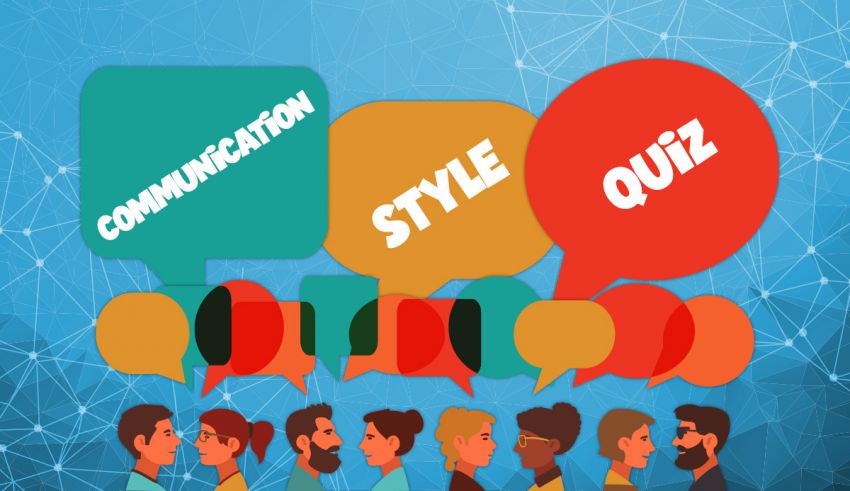
Communication Style Quiz Starter Kit
The test is designed to identify what type of interaction method do you mostly use. While humans can have multiple styles of speech, studies show that most of us have primary and secondary one.
Here, you find out what your main dialog pattern is and why.
· What Does Communication Mean?
According to the Transactional Model, “communication happens through the transaction of message between the speaker and listener.”
· What Are Its Different Styles?
Researchers have found that human interactions have four distinctive types, analytical, personal, intuitive, and functional. The said types are also known as the “Communication Styles.”
· How Do You Identify Someone’s Interaction Style?
The best way to identify someone’s speaking and listening type is by evaluating the eight elements of speech, friendliness, animation, attention, argumentativeness, drama, openness, emotional state, and dominance. (More on this below).
· Why Do I Need to Take the Quiz?
Understanding your exchange patterns helps you become a better communicator. Each style has its pros and cons. And knowing them enables you to get your message across conveniently.
Explaining the 4 Communication Types
Unlike some relationship-oriented categories like Love Languages, speech and listening forms affect all sorts of discussions—not just the romantic ones. Here is what each of the four primary styles means and how they would influence your daily dialogs.
Analytical
One with an Analytical Communication Style is data- and information-oriented. Such a person would find it difficult to trust or back people who do not present enough statistics/facts.
Upside: Analytical form of speech comes in handy in professional settings.
Downside: People with this type of dialog often seem cold, distant, and even emotionless.
Personal
Valuing emotional language more than the spoken one means you have a Personal Interaction Type. If that is the case, you are a good listener who finds it helpful to build relationships—rather than avoiding them.
Upside: Personal communicators are reliable problem-solvers. And they naturally tend to soothe over conflicts.
Downside: Such people might seem overly emotional for a professional setting.
Intuitive
If you have an Intuitive Communication Style, you aim for the big picture. Your speech might lack details. And you find it overwhelming when others focus on smaller aspects of the topic rather than the main idea.
Upside: Intuitive communicators waste no time. The style is desirable to leaders and professionals.
Downside: Not a good option for teaching a subject. Intuitive speeches might miss important details.
Functional
A Functional communicator focuses on the details rather than the big picture.
Upside: Good explainers and teachers.
Downside: Hard to keep the listener(s) engaged.
| Style: Analytical | Role: Scientist |
| Style: Personal | Role: Manager |
| Style: Intuitive | Role: Leader |
| Style: Functional | Role: Teacher |
Researchers Found the Communication Styles’ Key Factors
Recent data shows that eight elements identify your interaction style. Friendliness, animation, attention, argumentativeness, drama, openness, emotional state, and dominance are the key determiners of your style.
But analysis of the said findings proved that dominance, emotional state, openness, and expressiveness play a more significant role in defining one’s speech pattern.
So, a more dominant, open, expressive, and relaxed speaker is the ideal one.
How to Improve Your Style to Avoid Miscommunication
The Communication Style Quiz helps investigate your daily dialogs. However, that is not enough to become a better negotiator. So, here are the four tactics you need to become a sharp speaker.
Active listening instead of passive hearing.
You need to hear to be heard. However, actively listening to someone is different from waiting for them to finish, so you can continue talking. You should avoid passive listening to improve your Communication Style.
Paying attention to nonverbal signals.
Not all the messages get across through words. A professional communicator analyzes the other party’s body language and gestures as well as their arguments.
Keeping it a two-way interaction.
A forced dialog never works out. Let the other party comment on your expressions, and let them have enough time to express themselves properly.
Avoiding biased thinking and perceiving.
The Communication Style Quiz does check if you are a biased speaker/listener. But it is not difficult to figure that out. If you feel like you are always right and others do not understand you, the chances are significant that you are a subjective negotiator. However, only the objective speakers can create healthy dialogs. So, you might want to let your assumptions go before engaging in a conversation.
Things to Know Before Taking the Communication Style Quiz
Miscommunication is always right around the corner when two people are talking. And some might use their interaction type as an excuse for their misbehavior, rudeness, and even lack of negotiation skills. So, here are several things to have in mind before taking the test.
Dominance in speech is about responsibility.
Not allowing anyone to speak when you are talking is not a sign of dominance. When it comes to human affairs, dominance refers to being able to manage and run a speech. This includes allowing others to speak up, managing your time, and respecting your listeners.
Openness is increased when you let out some personal info.
Robotic dialogs are one of the main reasons for miscommunication. Instead of making yourself a talking doll, engage in more personal dialogs. Giving away some of your own experiences and feelings makes it easier for your listeners to engage in the conversation.
Now, let’s find out what your Communication Style is with a fun and engaging quiz.
































June 26, 2023
This was a fun quiz , I had to think on a couple of answers cause it gave a couple offers that I could have chosen two at a time
June 27, 2023
After reading about the difference in each communication style and taking the quiz, I feel I’m between Personal and Intuitive. This was very helpful to know.
June 27, 2023
Thanks for helping me to figure out what style of communication I use! I had no idea.
July 2, 2023
I think communicating is key. Listening and asking questions is important to me. Because I need all the facts so I can understand.
July 2, 2023
I feel like alot of people lie and cant handle the truth. i hate for someone to constantly cut me off.
August 28, 2023
great quiz and very useful information
August 28, 2023
This test was a great way to learn about my own communication skills and help me learn how it can be improved.
August 29, 2023
I feel that good communication is very important in life.
August 30, 2023
I really found myself in each section. I see why communication is a big deal. Without it there will be no knowledge. This is a factor and a trade everyone needs in life . Especially while working in all job fields.
August 31, 2023
Great now I know my style, yes I do agree with it. Wow.
September 3, 2023
I totally agree with my results.
September 5, 2023
I find this to be one of the most interesting test I’ve ever taken
I love it
October 24, 2023
I am a focused listener because I pay close attention to the conversations and surroundings around me
October 24, 2023
This is a great quiuz.